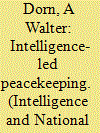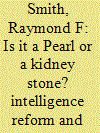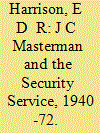| Srl | Item |
| 1 |
ID:
092979


|
|
|
|
|
| Publication |
2009.
|
| Summary/Abstract |
Two newly available sources for World War II intelligence history consist of French pre-war mainly intelligence documents held for years in the Soviet Union and recently returned to France and of German pre-war documents, primarily cryptologic, held for years in the United Kingdom and recently restituted to the Federal Republic. In addition, a memorandum of 1930 reveals that the future spy Hans-Thilo Schmidt frequently visited the factory making the Enigma machine and coolly asked the manufacturer for basic details, which they gave him and which he later sold to the French, leading eventually to the Allied reading of Engima-enciphered messages during World War II.
|
|
|
|
|
|
|
|
|
|
|
|
|
|
|
|
| 2 |
ID:
092976


|
|
|
|
|
| Publication |
2009.
|
| Summary/Abstract |
In the slums of Haiti, where pistol and machete wielding gangs dominated the populace through murder, intimidation, extortion, and terror, a UN peacekeeping mission managed to established law, order, and government control. The United Nations Mission for the Stabilization of Haiti (MINUSTAH) succeeded by 'taking on' the gangs in a series of military and police 'search and arrest' operations in 2006-07. The achievement was made possible by thorough 'intelligence preparation of the environment'. This paper tells the story of the 'intelligence-led' military-police-civil operations and how they transformed the Haitian slum of Cit Soleil from a foreboding place inaccessible to police for years to one in which the UN workers could safely walk its streets. The functions, structures, problems and challenges of the mission's intelligence capability are described, especially the work of the Joint Mission Analysis Centre (JMAC). Human intelligence proved to be key, while technologies helped considerably. Within the United Nations, intelligence remains a controversial and sensitive matter but the Haiti mission provides a valuable model of how to gather and use actionable intelligence.
|
|
|
|
|
|
|
|
|
|
|
|
|
|
|
|
| 3 |
ID:
092978


|
|
|
|
|
| Publication |
2009.
|
| Summary/Abstract |
A July 1990 cable from the US Embassy in Moscow that anticipated the collapse of the Soviet Union is a case study for an analysis in this article that seeks to make three points: 1) major failures in intelligence analysis are more likely to result when all elements of the intelligence community speak with one voice than when they disagree; 2) embassy reporting can play an essential role independent of that of the intelligence community in shaping Washington thinking about international events, but a variety of developments have made this increasingly difficult; 3) probability analysis plays too great a role in intelligence products and risk management too little.
|
|
|
|
|
|
|
|
|
|
|
|
|
|
|
|
| 4 |
ID:
092975


|
|
|
|
|
| Publication |
2009.
|
| Summary/Abstract |
The significance of J.C. Masterman's relationship with the Security Service, MI5, has not been fully appreciated. As a junior officer during World War II, he consistently sought to achieve good working relations with the Secret Intelligence Service. After the war he continued to take an interest in the Security Service and worked closely with other MI5 elder statesmen to ensure that the successor to Percy Sillitoe as Director-General came from within the Service. Masterman always hoped that his account of the double agents run by British Intelligence during World War II would one day be published. As the public image of the British secret services deteriorated during the 1960s, Masterman believed that MI5 did not grasp how his book could promote its interests, and so he insisted on forcing through publication anyway. The correspondence from serving and former MI5 officers in Masterman's papers vividly illustrate changing attitudes to official secrecy and the declining ability of the British Government to enforce it.
|
|
|
|
|
|
|
|
|
|
|
|
|
|
|
|